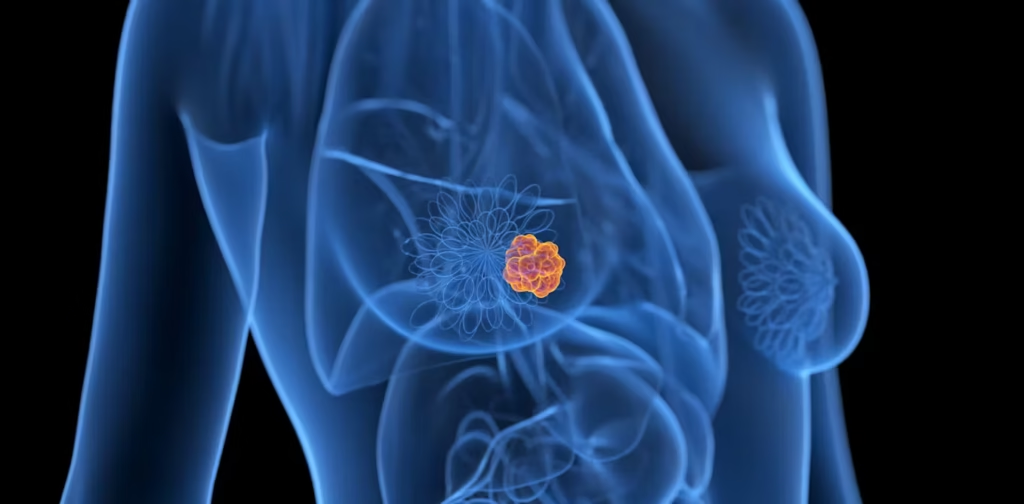
Overview
Breast cancer originates in the breast tissue, most commonly in the ducts or lobules. It is the most frequently diagnosed cancer in women worldwide and can also affect men. Subtypes include:
- Invasive ductal carcinoma (IDC) – most common type
- Invasive lobular carcinoma (ILC)
- Ductal carcinoma in situ (DCIS) – non-invasive
- Inflammatory breast cancer – aggressive and rare
- Triple-negative breast cancer
- HER2-positive breast cancer
Symptoms
- Breast lump or thickening
- Change in breast size or shape
- Skin dimpling or redness
- Nipple inversion or discharge
- Swelling or pain in the breast or armpit
Causes & Risk Factors
- Age (risk increases with age)
- Family history (BRCA1/BRCA2 mutations)
- Early menstruation or late menopause
- Hormone replacement therapy (HRT)
- Alcohol consumption, obesity, sedentary lifestyle
- Radiation exposure
Diagnosis
- Clinical breast exam and mammogram
- Breast ultrasound or MRI
- Biopsy (core needle, fine needle, or surgical)
- Hormone receptor and HER2 testing (ER/PR/HER2)
Treatment Options
- Surgery: lumpectomy, mastectomy, sentinel node biopsy
- Radiation therapy
- Chemotherapy
- Hormonal therapy (tamoxifen, aromatase inhibitors)
- Targeted therapy (e.g., trastuzumab for HER2+)
- Immunotherapy (e.g., for triple-negative breast cancer)
Prognosis
- Depends on stage, receptor status, and tumor grade
- Early-stage cancers have excellent survival
- 5-year survival rate:
- Localized: ~99%
- Regional: ~86%
- Metastatic: ~30%
Living with this Cancer Type
- Managing side effects of treatment
- Breast reconstruction or prosthesis
- Emotional and psychological support
- Long-term follow-up and survivorship care
Prevention & Screening
- Regular mammograms (starting age depends on guidelines)
- Breast self-exams and clinical exams
- Lifestyle modifications
- Genetic counseling and testing for high-risk individuals
FAQs
Q: Can men get breast cancer?
A: Yes, though it is rare.
Q: Can breast cancer be cured?
A: Many cases are curable, especially when detected early.
Q: What is triple-negative breast cancer?
A: It lacks estrogen, progesterone, and HER2 receptors and is treated with chemo or immunotherapy.
Resources
- Breast Cancer Foundation
- National Breast Cancer Coalition
- ClinicalTrials.gov
Understand Precision Testing
Learn how liquid biopsy and chemo sensitivity testing can personalize your treatment plan.
Make Informed Decisions
Gain knowledge to actively participate in treatment discussions with your healthcare team.
Improve Treatment Outcomes
Discover how precision medicine and metabolic therapies can enhance treatment effectiveness.
Start Your Educational Journey Today
Empower yourself with knowledge about precision metabolic oncology and take an active role in your cancer care journey.
Need More Information?
Our team of oncology experts is here to help you understand your diagnosis and treatment options.
